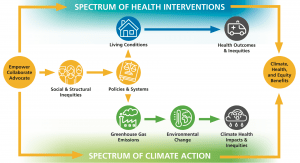I was reading through Sydney’s post “Tons of Hungry People and Tons of Wasted Food.” about the high amount of food waste being produced by American farms. I wanted to add to the discussion on food waste and food insecurity introduced by Sydney by discussing the inequality present in our current international food system. While America sees about 40% of the food it produces going to waste (63 million tons), there are growing concerns from the chief of the UN’s food relief agency that the world could be facing a widespread famine of “biblical proportions.” Reports indicate that 30 nations, all from the developing world, are under threat of undergoing widespread famine, with 10 of these nations already having more than 1 million people on the brink of starvation.

Map of areas where food insecurity is a concern, darker colors indictating the severity of the threat of famine.
This inequality when it comes to access and availability of food has been discussed in Clapp’s paper “Agricultural Trade Liberalization.” Clapp notes that trade policies employed by wealthy nations such as export subsidies and pressuring developing nations to lower tariffs on goods have led to producers in these more prosperous nations receiving better access to economic markets and, therefore, profit. This has led to an adverse effect on the economic and agricultural sectors of developing nations as these developing nations lose economic tools like tariffs and export taxes to strengthen their agricultural sector. At the same time due to export subsidies employed by wealthier nations, products from these richer nations have pushed out domestic agricultural producers leading to poverty and growing threats of hunger and famine as people in these developing nations are unable to pay for food due to their source of income being taken away due to import surges.
Sydney’s article illustrates the luxury of food production and food waste in America and richer nations, which stands in stark contrast to the fears of food insecurity in the developing world. Due to economic factors and fear of angering domestic producers, it is unlikely that richer nations will take the necessary steps to address the inequality in trade and politics between them and developing nations. Yet, could these richer nations not take steps to help alleviate the threat of famine by shipping excess production and “food waste” to these developing nations?


